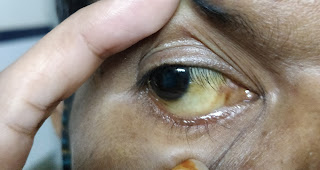Bimonthly internal assessment
October 8th
Case 1
1)Reason for this patient ascites
A : The common cause of Ascites is
Cirrhosis of liver bcz patient having truncal obesity and he's a chronic alcoholic
Altered echo texture of liver due to Cirrhosis causes portal hypertension leading to increased hydrostatic pressure causing fluid accumulation hence Ascites
Q2 Bilateral pedal oedema which is of pitting type is due to decrease in the albumin level trends due to course of the disease and long standing cirrhosis causing decrease in the production of proteins causing decrease in the oncotic pressure leading to accumulation of fluid
ulcerations are due his limited self practising manoeuvres done in inappropriate conditions such as
improper dressing of the wound, not maintaining aseptic conditions , indescriminate use of steroids .
Q3 Reason for Asterexis and constructional apraxia
A:
In hepatic encephalopathy (due to cirrhosis of liver ) damage occurs to brain cells due to the impaired metabolism of ammonia is predominantly related to the development of asterixis in hepatic encephalopathy,
Q4 efficacy of treatment intervention given
A:
1.high protein diet (eggs) for decreased albumin synthesis
2)water bed to prevent pressure bed sores in the dependent areas
3)Fluid restriction and salt restriction
4)Inj augmentin 1.2gm IV/BD to prevent secondary bacterial infections
5) Inj pan 40 mg IV/OD
6)Inj zofer 4mg IV/BD
7)Tab lasilactone
8)Inj vit k 10mg IM/ STAT ( as vitamin K causes coagulation to further prevent bleeding manifestions
9) Syp lactulose 15ml/PO/BD for hepatic encephalopathy
10.IVF 1 NS
11. Inj thiamine 100mg in 100mlNS /IV/TID as thiamine deficiency's occur in chronic alcoholics
12.strict BP/PR/TEMP/Spo2 CHARTING HOURLY
13.strict I/O charting
14.GRBS 6th hourly
15)protein x powder in glass of milk
CASE 2
https://sainiharika469.blogspot.com/2020/09/hello-everyone.html?m=1
Q1 1) Why were his antitubercular therapy stopped soon after his current admission? Was he symptomatic for ATT induced hepatitis? Was the method planned for restarting antitubercular therapy after a gap of few days appropriate? What evidence is this approach supported by?
ANS:- His ATT was stopped because of ELEVATED LIVER ENZYMES AND LIVER FAILURE (? ATT INDUCED LIVER DAMAGE)
2) What were the investigational findings confirming the diagnosis of pulmonary TB in this man?
ANS:- Infiltrates in CHEST X-RAY
Plueral thickening and fibrocavitory changes noted in HRCT.
Sputum positive TB with RIFAMPICIN sensitivity.
3) What was the cause of his ascites?
Ans: High saag and low ascitic protein Suggestive of cirrhosis is casue for ascites
LATE BUDD-CHIARI SYNDROME
HYPOALBUMINEMIA
4) What are the efficacy of each intervention mentioned in his treatment plan and identify the over and under diagnosis as well as over and under treatment issues in it.
High protein diet 4eggs daily for protein supplementation
ORS sachets in 1 litre of water to compensate electrolytes lost due to diarrhoea
Inj PIPTAZ 4.5gm for antibiotic cover
Vit k 10 mg Iv OD for 5 days to prevent forthcoming bleeding manifestations as his PT INR APTT are elevated
IVF - 1 DNS @50ml/hr for hydration
Nebulisation with salbutamol and mucomist 12th hourly for cough and crepts
Inj thiamine 100 mg in 100 ml NS IV TID. for chronic alcoholism.
CASE 3
https://sushma29.blogspot.com/2020/09/ascites-secondary-to-nephrotic-syndrome.html?m=1
1) What will be your further approach toward managing this patient of nephrotic syndrome? How will you establish the cause for his nephrotic syndrome?
Ans-The treatment for nephrotic syndrome is steroids
If this is steroid sensitive nephrotic syndrome the patient responds to the steroids
The cause for nephrotic syndrome maybe primary which is idiopathic or secondary such as
Glomerular pathology,diabetes ,cancer ,drugs ,infections and some congenital diseases
2) What are the pros and cons of getting a renal biopsy for him? Will it really meet his actual requirements that can put him on the road to recovery?
Ans-Renal biopsy would be helpful if the nephrotic syndrome is due to any glomerular pathology
There are disadvantages to the renal biopsy such as affordability of the patient,time taking,and the post biopsy complications.


Comments
Post a Comment